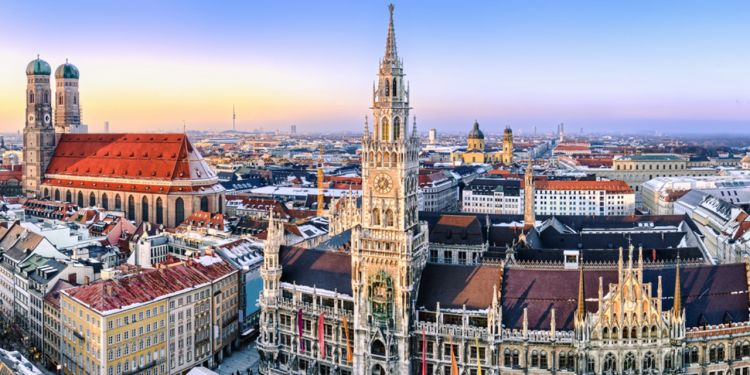
Munich is a charming, multicultural city that has gained popularity among expats and international students. Firstly, it hosts prestigious universities (i.e., Ludwig-Maximilians-Universität, Technische Universität München, the Munich University of Applied Sciences, and the Academy of Fine Arts), offering courses in most disciplines, leaving no one behind. Then, the city offers student-friendly activities and bustling nightlife. Last but not least, the employment prospects are bright, and students may find the opportunity to work in the city they studied, maintaining a good quality lifestyle.
Due to the city's proximity to Prague, Bern, Venice, and Vienna, international students, who are also avid travelers, will have the opportunity to explore the neighboring countries, which is highly recommended during the spring or summer months.
Why study in Munich?
Part of the studying experience in Munich is the everyday life and the new people you meet, who may also begin to form part of your professional network. Hence, Munich is an excellent city for students, not only because it has renowned higher education institutions collaborating with world-class universities globally but also because the city is full of life. From festivals and cultural events to sports and nightlife, Munich is a place where you will create many memories and build long-lasting friendships.
Quality education
Did you know that two of Munich's universities rank among the top 100 universities in the world? According to the QS world university rankings for 2024, the Technische Universität München (TUM or TU Munich) is in 37th place, and Ludwig-Maximilians-Universität München (LMU) is 54th worldwide. TUM is a member of the TU9 association, composed of the nine most prestigious technical universities in Germany. TUM, which aspires to foster future entrepreneurs, has over 52,000 students, of which 45% are international students.
Ludwig-Maximilians-Universität München, one of Europe's top research institutions, has been existing for over half a millennium. LMU offers studies in humanities, law, social sciences, medicine, and natural sciences through an interdisciplinary approach based on problem-solving.
Useful links:
Technische Universität München (TUM or TU Munich)
Ludwig-Maximilians-Universität München (LMU)
No tuition fees (at some Munich universities)
Living expenses in Munich may be among the highest in Germany. However, public universities, such as Ludwig-Maximilians-Universität München, offer quality degrees for free or at very affordable costs as long as you meet the entry requirements. The fact that no tuition fees are charged regardless of your nationality makes Munich score high on the affordability ranking, and even though life is expensive, you are allowed to work part-time during your studies in specially designed for students roles. Hence, even though your degree may be in English, it is worth preparing yourself to learn, at least, the basics of the German language to be able to compete for student jobs or, later on, graduate roles.
Promising employment prospects and starting salaries in Munich
For many German employers, Munich is known for producing highly adaptable, communicative, flexible, and motivated graduates. In the Global Employability University Ranking and Survey (GEURS) of 2023, conducted by Emerging, a graduate employability consultancy firm, recruiters have placed the Technical University of Munich at 12th place from 250 universities and LMU at 54th place globally. Both TU and LMU have benefited from the Excellence Initiative, a top-level research program that is particularly attractive to global recruiters. If you are considering finding a job in Germany after your graduation, you should keep in mind that gross salaries vary between three to five thousand euros per month, depending on the sector.
Munich is a student city
There are 28 colleges and four higher education institutes, of which nine are state-owned, 21 private, and two religious. About 126,000 students are studying in Munich, so out of the whole population, 8% are students. There are more than 15,000 students of foreign origin enrolled at the city's universities. Most international students come from other European countries such as Austria, Italy, Bulgaria, and France. Other countries of origin include India, China, Russia, and the US.
The local students find Munich to be a very attractive, safe, and tolerant city that has much to offer. Munich is a multicultural city with an open-minded atmosphere. You will get to know new people quickly, and it is never dull. Munich is a very green and welcoming city with great entertainment, leisure, and sports facilities. As of 2023/2024, the student semester ticket no longer exists, and students cannot use their university ID to travel for free or get discounted tickets. There is, however, the new €29 ticket, which is a good alternative.
Good to know:
The TU main campus is in the city center, offering many entertainment possibilities nearby. In addition, the building itself has a rooftop cafe with a fantastic view of the city.
Useful link:
The teaching culture in Munich
Munich universities promise highly trained and practice-oriented teachers. In fact, TU Munich accredits its success to the deep relationships between the university and industry in Bavaria. In other words, many of the university's professors also work for companies such as BMW, Siemens, and Lindner Group, giving students immediate insight into the work environment and preparing them for real-life business problems.
During their studies, students will attend both lectures (Vorlesungen), where the professor covers the theory at a quick pace, and hands-on seminars (Seminare) in smaller groups, where they will have the opportunity to ask questions and discuss topics with each other to apply newly acquired knowledge. Lectures tend to be non-compulsory and are often evaluated by an exam at the end of the semester, whereas seminars are mandatory and require submitting a paper (Hausarbeit) or a presentation (Referat) to pass the course. Some programs may include exercises (Übung) that go along with the lectures and offer a practical revision of what you've learned in the corresponding lectures. The first two to three semesters of the studies tend to be theoretical and cover more general knowledge, and it usually gets more practical and in-depth after that. The education system is rather hierarchical, and students should always address the teachers formally using “Sie” or “Herr/Frau”.
The teaching language in Munich
Some institutes offer degree programs in English such as TU Munich, LMU, and EU Business School Munich. Many universities may hold individual classes in English, but for most programs, you will need to have an acceptable level of fluency in German to enroll at a public university. German language certifications which are accredited and accepted by higher education institutions include:
- DSH – The Deutsche Sprachprüfung für den Hochschulzugang is usually taken at the local university;
- Goethe Institute certification, which can be taken in any country;
- TestDaF – Test Deutsch als Fremdsprache can be taken in your country;
- ZOP – Zentrale Oberstufenprüfung;
- KDS – Kleines Deutsches Sprachdiplom;
- GDS – Großes Deutsches Sprachdiplom, which is the most demanding.
Useful link:
EU Business School in Munich
Munich's most renowned universities
As we have already discussed, two of Munich's universities (i.e., Technische Universität München and Ludwig-Maximilians-Universität München) rank among the top 100 universities in the world. Other universities that Bavaria's state capital is proud to host are the Munich University of Applied Sciences, the Academy of Fine Arts, and the College for Television and Film.
Ludwig-Maximilians Universität München
Ludwig-Maximilians Universität München, also known as LMU or the University of Munich, is located in the heart of Munich, and it is the city's most prominent university with 51,000 students, many of whom are international students. LMU is a public research university recognized as one of Europe's premier research institutions. Established in 1472, LMU is one of the oldest, most prestigious universities in Germany and is associated with 36 Nobel laureates. Additionally, it is one of eleven German Universities of Excellence. LMU Munich is valued for its academic diversity, expanding from the humanities and cultural studies to economics, law, and social sciences, and from medicine to natural sciences. Ludwig-Maximilians University offers over 300 degree courses, including 96 Bachelor's and 130 Master's, as well as teaching degrees (Lehramtstudium). Studies usually begin in the winter semester, but some courses start in the summer semester. An increasing number of programs are being taught entirely in English.
Useful link:
Applications for admission at the LMU
Technische Universität München
Technische Universität München or TU München (TUM) was founded in 1868. More than 52,000 students attend lectures at the Technical University, of whom about 45% are from abroad. TU Munich is among the world's most prestigious universities, and it is primarily a research university and a member of TU9, an alliance of leading Universities of Technology in Germany. According to the QS World University Rankings, TUM is Germany's highest-ranked university. It offers a wide range of studies in engineering, life and medical sciences, natural sciences, and economics. Also, it covers a broad spectrum of fundamental and applied research. To date, there are about thirteen faculties and 178 programs of study, most of which are at bachelor and master's levels. It holds double degree agreements with over 20 universities and maintains partnerships with some 170 universities worldwide. Among the alumni are 13 Nobel Prize winners, 18 Leibnitz Prize winners, and ten IEEE Fellow Members.
Useful links:
TU9 German Universities of Technology
TU Munich application for international applicants
Hochschule für Angewandte Wissenschaften München (MUAS)
As the third-largest university, the Munich University of Applied Sciences offers more than 18,000 students over 85 bachelor's and master's degree programs across 14 departments. International students make up about 12% of the student body. MUAS was founded relatively recently, in 1971, and nowadays is the second-largest university of applied sciences in Germany. It offers degree programs and active academic collaboration in the MINT subjects (mathematics, computer science, natural sciences, and engineering), economics, public health and social sciences, as well as in design and architecture.
There are many other universities, which are specialized in film, music and theatre, philosophy, and administration. Bundeswehr University or Meisterschule für Mode (i.e., Master School of Fashion) offers a wide range of creative and research opportunities. Young artists learn their craft at the Academy of Fine Arts (Akademie der Bildenden Künste), while future film directors and producers study at the College of Television and Film (Hochschule für Fernsehen und Film). If you prefer to gain an academic degree with vocational training, you can do so at HFH Munich.
Useful links:
Universität der Bundeswehr München
German Master School of Fashion | Design School Munich
Hochschule für Fernsehen und Film
Entry requirements to German universities
As an EU citizen, you can freely come and study in Germany as long as you fulfill the basic entry requirements, such as a secondary school diploma (A-levels in England) and a recognized German language certificate. Most universities apply a numerus clausus (NC) based on the final grades of your A-levels and may require ability tests. For more information regarding admissions, you should check with the international students' help desk of the university of your choice. If you are a citizen from outside the EU–EEA, you must apply for a student visa at the German embassy or consulate in your home country. There are three kinds of student visas: the temporary student visa, valid for up to three months, the student visa per se, and the visa for language courses only. Be sure you are well organized with the visa procedure and that you start it as early as possible.
Important:
The application closing dates differ between universities. Generally, applications must be filed before January 15th for the summer semester (beginning in April) or before July 15th for the winter semester (starting in October). However, make sure to check well in advance to respect the deadlines for submitting your paperwork.
Scholarships in Germany
The Erasmus exchange program is an option to study in Germany for up to 1 year while practicing your German language skills and experiencing a different culture. You can find more information directly through your university and through the German embassy or consulate in your country. You can also check with the DAAD, the German Academic Exchange Service, which grants many scholarships for international students at various degree levels. Your host institution may also offer scholarships or grants. Do not hesitate to contact them for further information. Some fellowships offer non-governmental scholarships, such as the Einstein International Postdoctoral Fellowship. You can check for national scholarships based on your country of origin or your field of study. Students from EU countries may be eligible for BAföG, which is an interest-free half-loan, half-grant from the state.
Useful links:
German Academic Exchange Service
The cost of living in Munich
Munich is known for the highest rent prices in the country. However, living costs won't be higher than living in Paris or London. Be prepared to pay around 750 to 900 EUR per month to rent a room in a shared flat or for a single-bedroom apartment. Student accommodation in Munich is much cheaper but highly in demand. Be aware that health insurance is compulsory, and you will have to either get cover from your home country or ask the university's Studentenwerk for student offers. During the semester, students may work for 20 hours per week. Student jobs are pretty easy to get and tend to be fairly well-paid.
Good to know:
Make sure to use the numerous special student prices for transport, restaurants, sports facilities (Zentraler Hochschulsport), cultural events, the cinema, museums, swimming pools, and even hairdressers and retail shops.
Useful link:
Jobbörsenof LMU for student jobs
Nightlife, lakes, parks, and beer gardens in Munich
Munich's nightlife and student parties won't leave you disappointed. There are endless possibilities and always something going on. The LMU is right next to the English Gardens (Englischer Garten), with plenty of cafes, beer gardens, and restaurants to explore. There are many other parks, such as the Olympiapark or the banks of the River Isar. During the winter semester, there is, of course, Oktoberfest and the Christmas market in December. In spring, students enjoy the Frühlingsfest, a smaller version of Oktoberfest, and in summer, the many nearby lakes and mountains make it a popular destination.
Tip: Bavarian cuisine is known for many meat and Knödel dishes and is closely connected to Austrian, Tyrol, and Czech cuisine. Try Münchner Weißwurst with a pretzel and sweet mustard. Schweinshaxe (pork), Grillhendl (grilled chicken) and, of course, the many local beers are typical for the region.
Student housing in Munich
Flat hunting in Munich can be challenging, so it's best to start early. Most students live in shared flats or university student housing, which is advertised online, on student notice boards, or through the local Studentenwerk (National Association for Student Affairs) at your university. The Studentenwerk München offers 11,000 rooms, which tend to be affordable and central. Your chances will increase if you apply for dormitories in less popular locations in advance. Note that a lot of students apply up to two years in advance. To find your own flatshare, known as a WG or Wohngemeinschaft, we have dropped some websites in the Useful Links section to help you get started. Popular student areas are Schwabing and Maxvorstadt for their proximity to TU and LMU. Haidhausen and Glockenbach are close to the center and equally famous, especially for their bars and nightlife. We recommend you subscribe to Expat.com's Munich forum to start conversations with other students or students-to-be in Germany.
Tip: Sharing a flat or house with other students will help you adjust faster and improve your German language skills, and it will make it so much easier to make new friends.
Useful links:
General advice for international students in Germany
Be organized. German universities will be happy to advise but won't hold your hand. While enjoying the privilege of (mainly) free education at a public university, it's up to you to attend your lectures and study. You will be treated like a local, and it's unlikely anyone will remind you to catch up with missed classes. You only get out what you put in! This may be different at private teaching institutions.
We do our best to provide accurate and up to date information. However, if you have noticed any inaccuracies in this article, please let us know in the comments section below.











